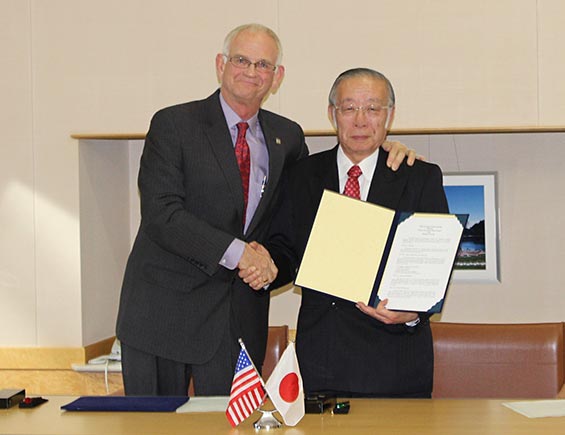
At a ceremony at Miyagi University’s Yamato campus on December 15, Temple University, Japan Campus (TUJ) and Miyagi University (MYU) signed a Memorandum of Understanding (MOU) to collaborate on academic programs, initiatives and exchanges.
The main purpose of the MOU is to promote academic collaboration between TUJ and MYU that will explore, facilitate and sustain academic programs, joint research, cultural exchanges, and other educational initiatives. This is a part of our mission as an American institution to support the development of international education in Japan.
Until now, other than our programs at Tohoku University of Community Service and Science, most programs TUJ has developed with Japanese universities have been in the Tokyo metropolitan area.
TUJ and MYU will start discussing the details of the collaboration.
Possible areas of collaboration include:
- Exchange of faculty and staff members
- Exchange of students
- Joint research projects
- Shared grants and sources of funding
- Other joint educational and cultural programs
Comments from the President and Dean
Masaru Nishigaki, President, Miyagi University
Founded in 1884 in Philadelphia in the U.S., Temple University has a long history and tradition, and the MOU with its Japan Campus gives Miyagi University students, faculty and staff a great opportunity to learn. We at Miyagi University are working on reforming our educational system to enable our students to have a global perspective and to gain knowledge in depth. I believe the educational opportunities presented by this MOU will bring great results.
I have known Dean Stronach for many years. I trust him as my colleague and regard him with my deepest respect as a researcher in the field of international politics, as an educator who has been a president at a Japanese university, and as a contributor to Japanese university reform. I hope this kizuna (personal bond) will strengthen the relationship between the two institutions.”
Bruce Stronach, Dean, Temple University, Japan Campus
I came to know Miyagi University through my friendship with President Nishigaki, and we understood that both institutions have much to gain by a relationship. It gives TUJ students the opportunity to experience another part of Japan as well as support the disaster area by doing internships and volunteer activities. It enables MYU students to experience a true American university education in Tokyo. It also allows for faculty and staff exchange which helps faculty development at both institutions and gives our faculty the opportunity to help develop MYU’s internationalization on site.
We hope that in the future we will be able to develop a range of cooperative programs that can also encompass cooperative programs that each institution has with third party institutions, including the possibility of linking MYU academic programs with Temple University in Philadelphia.”
About the Liberal Arts Symposium
To celebrate the signing of the MOU, a symposium on liberal arts was held at the Taiwa campus of MYU. Dean Stronach gave a keynote speech on “Liberal Arts in Japan and the U.S.,” and a panel of Japanese university presidents and Dean Stronach discussed the differences between liberal arts education in Japan and the U.S. as well as the future of liberal arts. The panel consisted of Masaru Nishigaki, President, Miyagi University; Bruce Stronach, Dean, Temple University, Japan Campus; Shigeaki Kadoyama, President, Aizu University; and Norihiko Suzuki, President, Akita International University.
About Miyagi University
Miyagi University (MYU) was founded as a public university in 1997 in Miyagi Prefecture. It has two campuses in Miyagi. It currently has three schools, Nursing, Project Design, and Food, Agricultural and Environmental Sciences. Students study subjects in medical, business, and nutrition fields.
